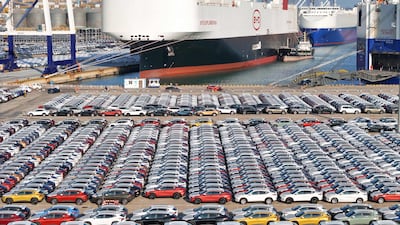Global economic prospects remain subdued and are fraught with uncertainty as more than half of chief economists expect the world economy to further weaken this year, a World Economic Forum report has said.
With uncertainty clouding the near-term economic outlook, a majority of public and private sector chief economists surveyed by the WEF warned of rising fiscal strains (79 per cent) and divergence between higher- and lower-income economies (66 per cent).
“Amid accelerating divergence, the resilience of the global economy will continue to be tested in the year ahead,” WEF managing director Saadia Zahidi said in the forum's latest Chief Economists Outlook report on Monday.
“Though global inflation is easing, growth is stalling, financial conditions remain tight, global tensions are deepening and inequalities are rising.”
The report highlights the “precarious nature of the current economic environment” and there is an urgent need for global co-operation to build momentum for sustainable and inclusive economic growth, Ms Zahidi added.
The world economy, which managed to avoid a recession last year, is still facing headwinds amid mounting geopolitical tension that could create “fresh near-term hazards for it”, the World Bank said last week.
The global economy is set to post its slowest half-decade growth in 30 years, with the raging conflict in the Middle East among key downside risks to the outlook, the Washington-based lender said in its Global Economic Prospects report.
Most advanced and developing economies will grow at a slower pace this year and the next than they did in the decade before the Covid-19 pandemic, with global gross domestic product slowing for a third year in a row to 2.4 per cent in 2024.
The International Monetary Fund expects the global economy to expand by 2.9 per cent this year while the Organisation for Economic Co-operation and Development forecasts growth at 2.7 per cent.
However, despite economic headwinds, about 43 per cent of chief economists surveyed by the WEF foresee unchanged or a bit stronger economic conditions this year, compared with the last year.
Regionally, chief economists expect the pace of economic growth to remain divergent across regions.
The most buoyant economic activity is still expected in South and East Asia, with China being an exception in the region. About 70 per cent of those surveyed expect largely moderate growth in the region.
In the US and the Mena region, the outlook has weakened since the September 2023 edition of the Chief Economists Outlook, with about six in 10 respondents expecting moderate or stronger growth this year.
In Europe, 77 per cent expect weak or very weak growth in 2024.
The latest survey primarily focuses on two key phenomena affecting the global economy – geopolitical developments and advancements in generative AI.
WEF managing director
About seven in 10 chief economists expect the pace of geoeconomic fragmentation to pick up this year.
Most respondents said it would stoke volatility in the global economy (87 per cent) and in stock markets (80 per cent).
“There appears to be an equally strong consensus that recent geopolitical developments will increase localisation (86 per cent) and strengthen geoeconomic blocs (80 per cent),” according to the WEF survey.
“Almost six out of ten (57 per cent) also expect it to increase inequality and widen the North-South divide in the next three years.”
The rapid advances in artificial intelligence pushed it to the top of business and policy agendas in 2024.
However, survey respondents are more optimistic about AI-enabled benefits in high-income economies than in developing economies.
They expect AI to help increase the efficiency of output production (79 per cent) and innovation (74 per cent), with a more mixed picture regarding standards of living (57 per cent).
“Chief economists are almost unanimous (94 per cent) in expecting productivity gains to become economically significant in high-income economies in the next five years, compared to only 53 per cent for low-income economies,” the survey said.


